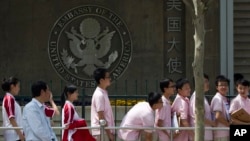Student Union
Arrests roil campuses nationwide ahead of graduation
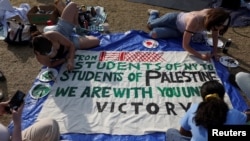
Protests are roiling college campuses nationwide as schools with graduation ceremonies next month face demands they cut financial ties to Israel because of the Israel-Hamas war.
Many campuses were largely quiet over the weekend but protesters on both sides of the issue shouted and shoved each other during dueling demonstrations Sunday at the University of California, Los Angeles.
About 275 people were arrested on Saturday at various campuses including Indiana University at Bloomington, Arizona State University and Washington University in St. Louis.
The number of arrests nationwide approached 900 since New York police removed a pro-Palestinian protest encampment at Columbia University and arrested more than 100 demonstrators on April 18.
Since then, students have dug in at dozens of pro-Palestinian encampments around the country, prompting a range of responses from administrators: arrests and criminal charges, student suspensions or simply continued pleas to leave.
The plight of students has become a central part of protests, with both the students and a growing number of faculty demanding amnesty for protesters. At issue is whether the suspensions and legal records will follow students through their adult lives.
Faculty members at universities in California, Georgia and Texas have initiated or passed largely symbolic votes of no confidence in their leadership.
White House national security spokesman John Kirby said President Joe Biden "knows that there are very strong feelings" but would leave managing the protests to local authorities.
"People should have the ability to air their views and to share their perspectives publicly but it has to be peaceful," Kirby said on ABC's "This Week."
In an interview that aired Sunday, Senate Republican Leader Mitch McConnell called it "a dangerous situation" and placed the responsibility with college administrators.
"There's also antisemitism, which is completely unacceptable. I've been shocked to see that in this country," he said on NBC's "Meet the Press."
How it started
Early protests at Columbia University in New York City sparked pro-Palestinian demonstrations across the country and students and administrators there have engaged in negotiations, the university said in a statement Saturday night.
Columbia has set a series of deadlines for protesters to leave the encampment — which they have missed — but bringing back police "at this time" would be counterproductive, the school wrote in an email to students.
On Sunday, students walked among dozens of colorful tents that continue to stand.
California
At the University of California, Los Angeles, police set up barricades before hundreds of demonstrators on both sides joined a growing crowd Sunday near where pro-Palestinian students have been staying around-the-clock in tents. Counter-protesters who organized a "Stand in Support of Jewish Students" rally said their goal was to "stand up against hatred and antisemitism."
Across town, the University of Southern California said it was open Sunday after being shut down a day earlier because of what the university called vandalism and disruptions.
USC drew criticism after refusing to allow the valedictorian, who has publicly supported the Palestinian cause, to make a commencement speech. Administrators then scrapped the keynote speech by filmmaker Jon M. Chu. Last week the school announced the cancelation of its main graduation event, a day after more than 90 protesters were arrested by police in riot gear.
In the northern part of the state, officials on Saturday ordered an "enforced hard closure" of California State Polytechnic University, Humboldt. Two halls remained occupied by pro-Palestinian demonstrators. The school said Sunday that the cost of the occupation — including damage done by "theft, vandalism and graffiti" — was estimated to be in the millions.
Missouri
Washington University in St. Louis locked some campus buildings and arrested protesters Saturday. Photos showed uniformed police attempting to remove masked protesters as others, also wearing masks, linked arms to thwart the efforts.
In a statement, the university said more than 100 people — including 23 students and four university employees — were arrested on suspicion of trespassing. Megan Green, president of the St. Louis Board of Aldermen, said in a social media post that she was present and the protest remained calm "until the police came in like an ambush."
Green Party presidential candidate Jill Stein said in a social media post that she and two of her campaign managers were among those arrested.
The university's statement defended the action and said protesters "did not have good intentions on our campus and that this demonstration had the potential to get out of control and become dangerous."
Some arrested also face charges of resisting arrest and assault, including for injuries to three police officers, the statement said. Those injuries include a severe concussion, a broken finger and a groin injury.
The Missouri chapter of the Council on American-Islamic Relations condemned the arrests as "heavy-handed."
Massachusetts
In Boston, police in riot gear cleared an encampment on the campus of Northeastern University on Saturday.
Massachusetts State Police said about 102 protesters were arrested and will be charged with trespassing and disorderly conduct.
Northeastern said in a statement that the demonstration, which began two days ago, had become "infiltrated by professional organizers" with no affiliation to the university and antisemitic slurs, including "kill the Jews," had been used.
The Huskies for a Free Palestine student group disputed the university's account, saying in a statement that counterprotesters were to blame for the slurs and no student protesters "repeated the disgusting hate speech."
Students at the Boston protest said a counterprotester attempted to instigate hate speech but insisted their event was peaceful.
U.S. campuses and the Israel-Hamas war
The nationwide campus protests began in response to Israel's offensive in Gaza. Hamas launched a deadly attack on southern Israel on Oct. 7, when militants killed about 1,200 people, most of them civilians, and took roughly 250 hostages. Vowing to stamp out Hamas, Israel launched an offensive in Gaza. In the ensuing war, Israel has killed more than 34,000 Palestinians in the Gaza Strip, according to the local health ministry.
Israel and its supporters have branded the university protests as antisemitic, while critics of Israel say it uses such allegations to silence opponents. Although some protesters have been caught on camera making antisemitic remarks or violent threats, organizers of the protests, some of whom are Jewish, say it is a peaceful movement aimed at defending Palestinian rights and protesting the war.
See all News Updates of the Day
- By VOA News
International students discuss US campus culture shock

International students at De Anza College in Cupertino, California, talked about culture shock in an article in La Voz News, the student newspaper.
"It felt like a major culture shock. Everything was so different, from academics to mannerism," said a student from Mexico.
Read the full story here.
These are the most expensive schools in the US
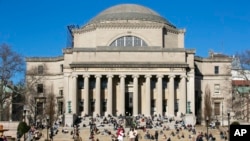
High tuition costs along with housing and food expenses can add up for students at U.S. colleges and universities.
MSNBC looked at the most expensive schools in the country, with one costing more than $500,000 for a bachelor’s degree. (June 2024)
Uzbekistan students admitted into top US universities
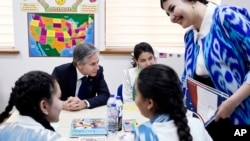
Students from Uzbekistan are among the international students admitted to top colleges and universities in recent years.
Gazata.uz profiled some of the Uzbekistan students attending Harvard, Brown, Princeton and other U.S. universities. (June 2024)
- By Stella Hsu
Reports of visa checks, deportations worry Chinese STEM students in US
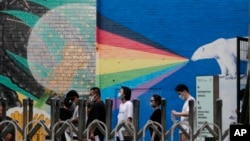
Geopolitical tensions and growing competition in tech between the United States and China appear to be spilling over into academia despite commitments from the world’s two biggest economies to boost people-to-people exchanges.
The United States remains the top choice for Chinese students seeking to study abroad with nearly 300,000 studying in American colleges and universities during the 2022-2023 school year. But reports of some cases that students and professors are facing extra scrutiny while passing through immigration and the deportation of others are raising concerns.
For Chen Xiaojin, a doctoral student studying semiconductor materials at a university in the Washington, D.C., metropolitan area, it has been six years since she returned to her hometown of Beijing.
At first, it was the COVID-19 pandemic that kept her from going home. But over the past two years, she has been deterred by accounts of Chinese students majoring in science and engineering being required to reapply for their visas upon returning to China.
She also says she is worried by reports over the past six months of Chinese students being deported, even at nearby Dulles Airport.
"My current research is relatively sensitive, and my boss [adviser] is getting funds from the U.S. Department of Defense, making it even more sensitive,” she told VOA. "I am afraid that I won't be able to return after I go back [to China]."
Chen says that if she did return to China, she would have to apply for a new visa.
In a report late last month, Bloomberg said it had found at least 20 Chinese students and scholars with valid visas who were deported at U.S. Customs since November and barred from reentry. The U.S. Customs and Border Protection Agency does not release relevant data.
Immigration attorney Dan Berger represented one Chinese student who was deported late last year. He tells VOA Mandarin that the student studied biological sciences at Yale University and was about to complete her doctorate.
She visited her family in China and got a new visa but was deported by customs at Dulles Airport and barred from reentering the country for five years. Berger said he did not see anything suspicious in the transcript of the conversation between the student and the customs officer.
"We have seen what seems like a pattern over the last six months of Chinese PhD students being turned around…. more than I've seen in quite a while," he said.
Matthew Brazil, a fellow at the Jamestown Foundation, said neither country seems willing to explain the situation. However, he believes that in most cases, the United States must have valid reasons for blocking visa holders from entering the country.
In some cases, the student’s background may not match what is written on the visa application. In other cases, customs agents may also find something that the State Department missed, and once they see it, they are responsible for taking action.
"I wish the Chinese side would be specific about their students who were refused entry,” he said. “The fact that both sides are mum on details and that the Chinese side is engaged with the usual angry rhetoric means that each has security concerns. And that says to me that there was good reason for the U.S. to stop these particular applicants."
Brazil also sees a connection between the entry denials and export control regulations issued by the United States in October 2022 that restrict China's ability to obtain advanced computing chips, develop and maintain supercomputers, and manufacture advanced semiconductors.
U.S. Customs and Border Protection is one of the law enforcement agencies authorized to investigate violations of export control regulations, he said.
"Beijing's intelligence agencies are known to focus attention on PRC [People's Republic of China] students and scientists headed abroad who study or work on dual-use technologies controlled under the Export Administration Act — compelling Chinese students and scientists to report on what they've learned when they return to China on holiday,” he said. “This has been true for decades."
Bill Drexel, a fellow for the Technology and National Security Program at the Center for a New American Security, said the U.S. government did find some cases where students tried to steal strategic technology for China.
"I think it would both not be surprising that they found some really questionable or incriminating evidence for some students,” he said. “It would also not be surprising if, in their hunt for really solid evidence, they also may have made some mistakes on other students.”
Drexel adds that “it’s just kind of an unfortunate fact of the time that we live in and the tactics that the CCP uses when it comes to these measures."
In a post on X in early May, U.S. ambassador to China Nicholas Burns tried to dispel concerns about visas and entry to the United States for students and scholars. In the post, he said "99.9% of Chinese students holding visas encounter no issues upon entering the United States.”
In an interview with The Wall Street Journal Monday, Burns said it is China that is making it impossible to promote people-to-people ties. Burns told the Journal that students attending events sponsored by the United States in China have been interrogated and intimidated.
He also said that since U.S. President Joe Biden and China’s leader Xi Jinping held their summit in San Francisco last year, China’s Ministry of State Security and other agencies had interfered with Chinese citizens’ participation at some 61 events.
At a regular briefing on Wednesday, Chinese Foreign Ministry spokesperson Mao Ning dismissed those accusations, saying that they did not “reflect reality" and that went against key understandings reached by both countries’ presidents in San Francisco.
“The United States, under the pretext of 'national security,' unjustifiably harasses, interrogates, and deports Chinese students in the U.S., causing them significant harm and creating a severe chilling effect,” Mao said. “The image of the United States in the minds of the Chinese people fundamentally depends on the actions of the United States itself.”
Drexel said he believes Burns’ comments about visas and students' willingness to study in the U.S. still ring true.
“On balance, it's still the case that American universities are overwhelmingly warm towards Chinese students and want them in large numbers," he said.
However, Berger, the immigration lawyer, is concerned about the chilling effect recent cases involving Chinese students could have.
"In general, we are being more careful about advising Chinese graduate students in STEM fields about traveling and letting them know that there is some small risk,” he said.
Even though the risk is small, it does seem to be real at the moment, he said.
Adrianna Zhang contributed to this report.
US federal judge blocks new regulation targeting for-profit colleges
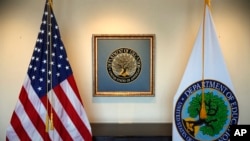
A federal judge in Texas has blocked a regulatory provision targeting for-profit colleges that was scheduled to take effect in July 2024.
Times Higher Education reports that the rule, which would affect student loans, was challenged by for-profit institutions. (June 2024)





